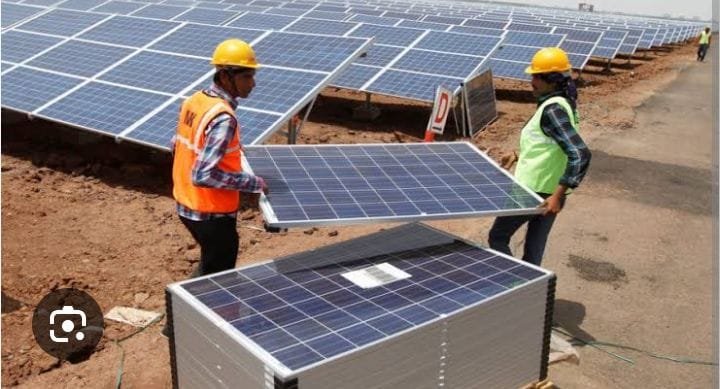Abia’s Future Shines Bright – Powered by Sun, Water, & Innovation!
Introduction
In Aba, the bustling commercial heart of Abia State, was once the hum of diesel generators was a grim anthem to energy failure. Businesses and households in this vibrant industrial hub groan under the weight of exorbitant energy costs, once spending up to 70% of their profits on fuel to power generators— it was a lifeline in the absence of reliable grid electricity. It’s on record that for cottage factories producing leather goods, textiles, and machinery, this reality stifled growth, eroded competitiveness, and forced many to shut down entirely. Meanwhile, as at today in Ohafia Local Government Area, entire communities languish in darkness, with schools, health centers, and markets disconnected from the national grid. The absence of electricity here isn’t just an inconvenience; it’s a barrier to education, healthcare, and economic survival, trapping residents in a cycle of poverty and stalling the promise of rural development.
The ripple effects of this energy crisis are catastrophic for Abia’s economy. Small-scale manufacturers, once the pride of the state’s industrial landscape, now operate at a fraction of their capacity, unable to meet demand or retain skilled workers. In rural Ohafia, farmers lack refrigeration to preserve perishable goods, while artisans rely on costly, polluting kerosene lamps. This energy poverty isn’t merely a infrastructural failure—it’s a theft of potential, robbing Abia’s youth of job opportunities and dimming the prospects of a state endowed with abundant resources and human ingenuity.
Yet, amid this bleak reality lies a roadmap for transformation. As explored in the earlier analysis of Abia’s renewable energy opportunities, the state’s solar potential, agricultural waste, and untapped hydro resources offer tangible solutions to these systemic challenges. From solar mini-grids that could electrify Ohafia’s villages to bioenergy projects turning palm waste into power for Aba’s factories, the shift to renewables isn’t just aspirational—it’s a pragmatic escape from the stranglehold of energy poverty. By bridging the gap between Abia’s crippling present and its sustainable future, renewable energy promises not only to relight homes and workshops but to reignite the entrepreneurial spirit that once defined this resilient region.
Renewable Energy Progress in Abia State: Current Initiatives and Future Potential
Abia State is steadily advancing its renewable energy agenda through targeted projects aimed at tackling energy poverty and fostering sustainability. A flagship initiative, “Light Up Abia,” has transformed urban landscapes in Umuahia and Aba by deploying thousands of solar-powered streetlights, enhancing public safety, reducing reliance on fossil fuels, and symbolizing the state’s commitment to clean energy. Beyond illumination, the program serves as a foundation for broader solar adoption, with plans to expand into rural areas. Complementing this effort, the state is collaborating with the International Solar Alliance (ISA) to draft mini-grid regulations, paving the way for decentralized solar systems that could electrify off-grid communities. These mini-grids, once operational, promise to power homes, schools, and small businesses, bridging the energy gap that has long stifled development in regions like Ohafia and Arochukwu.
Solar energy remains central to Abia’s strategy, given its abundant sunlight and growing urban energy demands. The government is exploring large-scale solar farms and incentivizing rooftop installations for households and industries, particularly in manufacturing hubs like Aba, where erratic grid power forces reliance on expensive diesel generators. Additionally, the state’s network of rivers, including the Imo and Aba Rivers, presents untapped potential for small-scale hydropower projects. Such initiatives could diversify the energy mix, providing stable power during rainy seasons and complementing solar infrastructure. Together, these projects position solar and hydropower as twin pillars for achieving energy security while reducing carbon emissions.
The Abia State government has demonstrated political will by prioritizing renewable energy in its development agenda, seeking partnerships with global organizations and private investors to scale projects. This proactive approach aligns with Nigeria’s national energy transition goals and reflects an understanding of renewables as catalysts for economic growth. For instance, reliable solar power could revive Aba’s cottage industries, lower production costs for artisans, and create jobs in clean energy installation and maintenance. While challenges like funding gaps and technical capacity persist, Abia’s progress—from solar streetlights to hydropower exploration—signals a transformative shift toward a sustainable, energy-secure future for its people.
Harnessing Renewable Energy in Abia State: Opportunities and Challenges
Abia State, is increasingly positioning itself to leverage renewable energy as part of broader efforts to address energy poverty, drive economic growth, and contribute to national and global climate goals. While the state may not yet boast large-scale projects like Kenya’s geothermal plants or South Africa’s solar parks, its strategic location, agricultural potential, and growing urbanization create a fertile ground for renewable energy innovation. Here’s are Governor Otti’s exploration of Abia’s renewable energy landscape, inspired by continental trends and tailored to local realities.
Otti harps on Key Renewable Energy Opportunities for Abia State
- Solar Power Expansion
Abia State, Otti once hinted, like much of Nigeria, enjoys abundant sunlight year-round, making solar energy a viable solution. Small-scale solar projects are already emerging, particularly in urban centers like Umuahia and Aba, where businesses and households use rooftop solar panels to mitigate unreliable grid power. The state government has scaled this by partnering with firms to develop solar mini-grids for rural communities, mirroring successful models in other African nations. For instance, a proposed solar farm in Isuikwuato will power local industries and reduce dependence on diesel generators. - Bioenergy from Agricultural Waste
Abia’s thriving agricultural sector, known for palm oil, cassava, and yam production, generates significant organic waste. Dr Alex Chioma Otti is so excited that projects converting agricultural residues into biogas or bioethanol—similar to Sierra Leone’s Addax Bioenergy initiative—will provide clean cooking fuel and electricity for rural areas. The Abia State Waste-to-Energy Program, still in its infancy, highlights this potential, aiming to turn palm kernel shells and cassava peels into energy sources. - Mini-Grids for Rural Electrification
Over 50% of Abia’s rural population lacks reliable electricity. Solar mini-grid projects, funded by organizations like the African Development Bank (AfDB) or the UNDP, is poised to replicate successes seen in Kenya and Rwanda. Pilot projects in communities like Ohafia and Arochukwu will bridge the energy gap, powering schools, health centers, and small businesses. - Hydroelectric Potential
While not as prominent as geothermal in Kenya, Abia’s rivers and streams, such as the Imo River, offer opportunities for small-scale hydroelectric projects. These will definitely supplement solar energy during rainy seasons, ensuring a more stable renewable energy mix.
Drivers of Renewable Energy Adoption
- Economic Necessity: Abia’s industrial hubs, like the Ariaria International Market, once relied heavily on costly fossil fuels. Geometric Power solutions seem costly. Therefore, transitioning to renewables will reduce operational costs and boost competitiveness.
- Climate Commitments: Nigeria’s pledge to achieve net-zero emissions by 2060 aligns with Abia’s goals under its Sustainable Development Strategy.
- Youth Innovation: In Abia, there are over 3,913 active tech-savvy actors hosting local startups (e.g., Green Energy Africa) and are driving grassroots solar and biogas solutions.
- International Partnerships: The state has concluded ties with organizations like the World Bank to fund its energy transition roadmap.
Challenges Otti still has to Overcome
- Funding Gaps: After a brief discussion with one of the governor’s aide who pleaded to be anonymous, hinted that Otti is still very much concerned that limited state revenue and bureaucratic hurdles may delay project implementation.
- Grid Infrastructure: Government is also concerned that aging transmission systems hinder integration of renewables into the national grid. Hence, the drive to deepen off-grid solutions.
- Awareness and Skills: Dr Otti is alarmed that technical expertise in renewable energy management remains scarce, requiring targeted training programs.
- Policy Inconsistencies: While the federal government’s Energy Transition Plan is progressive, state-level regulations needs more strengthening to attract private investors.
Future Outlook
Abia State has the potential to become a renewable energy leader in Nigeria’s southeast. Prioritizing public-private partnerships, community-led mini-grids, and bioenergy projects could transform its energy landscape. Initiatives like the proposed Abia Green Corridor—a plan to develop solar farms along the Umuahia-Aba axis—could set a benchmark for other states. With increased funding, capacity building, and policy alignment, Abia can replicate the successes of nations like Kenya and Ghana while addressing its unique energy needs.
Conclusion
Abia’s journey toward renewable energy mirrors broader African trends but requires localized solutions. By harnessing solar, bioenergy, and mini-grid technologies—and learning from continental pioneers—the state can achieve sustainable development, improve livelihoods, and position itself as a model for Nigeria’s energy transition. As Governor Alex Otti noted in 2023, “Energy is the backbone of industrialization; for Abia to thrive, renewables must be at the heart of our progress.”

RenewableEnergyLeader
SustaunableSouthEast
Dr Chukwuemeka Ifegwu Eke writes from the University of Abuja/Gowon University Nigeria







